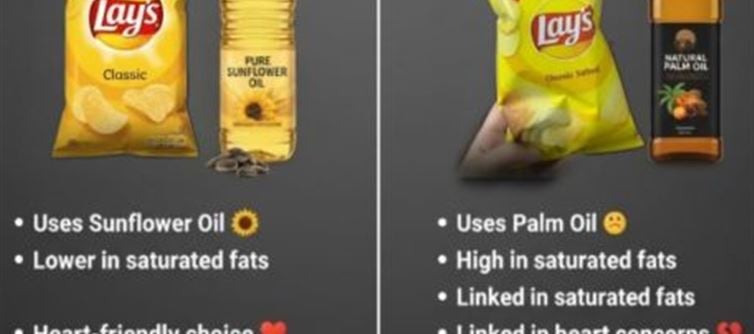
The Hidden economics Behind Why Lays Uses Healthier Oils in the USA and Cheaper Oils in India
At first glance, this looks like corporate hypocrisy: sunflower oil for the West, palm oil for India. But the deeper story is more complex—and reveals how economics, culture, and supply chains quietly shape the food we consume.
India is one of the world’s largest consumers of packaged snacks. It is also one of the most price-sensitive markets on earth. For FMCG giants, profitability in india depends on mass-volume, razor-thin margins. Here’s where oil choice becomes strategic.
Sunflower oil is significantly more expensive and subject to global supply volatility. Palm oil, however, is abundant, cheap, shelf-stable, and has a higher smoke point—making it ideal for large-scale industrial frying. The economics are unambiguous.
But economics alone doesn’t explain the double formula strategy.
The US market is health-conscious, highly regulated, and heavily litigious. Any ingredient linked to health risks faces lawsuits, bad press, and consumer backlash. This forces brands to comply with healthier norms—even if it costs them more.
In india, the ecosystem is different:
Health literacy is rising but still not mainstream.
Packaged food labeling is not culturally prioritized.
Regulations offer broader flexibility.
Consumers rarely protest ingredient choices if the product is tasty and affordable.
In essence, companies tailor their ingredients not to nutrition science but to behaviour and regulation.
The controversial part?
This creates a global nutritional inequality where developing markets end up with formulations optimized for profit rather than wellness.
Yet the story isn’t entirely villainous. Palm oil supports millions of farmers globally, especially in indonesia and Malaysia. india imports heavily, making it politically and economically integrated into the supply chain.
The real solution lies not in vilifying brands but in strengthening:
consumer awareness
labeling literacy
regulatory standards
domestic pressure for healthier substitutions
This “oil divide” is simply a symptom. The real challenge is building a market that demands and rewards healthier choices. Until then, corporations will always default to the path of least resistance.
The Lays packet, then, becomes a quiet indicator of a nation’s regulatory strength, consumer expectations, and corporate accountability.
And that’s why this debate matters—not because of chips, but because it shows how global companies read us, respond to us, and ultimately decide what goes into our bodies.
#FoodPolitics #HealthInequality #CorporateEthics #PalmOilDebate #GlobalBrandsIndia #ConsumerAwareness #FoodSafetyIndia #InvestigativeJournalism #HiddenTruths
Lays oil controversy, sunflower oil vs palm oil, indian snack industry, food regulations india, corporate double standards, unhealthy oils, LDL cholesterol, FMCG strategies india, health awareness India
“One Brand. Two Recipes. zero Transparency.”




 click and follow Indiaherald WhatsApp channel
click and follow Indiaherald WhatsApp channel